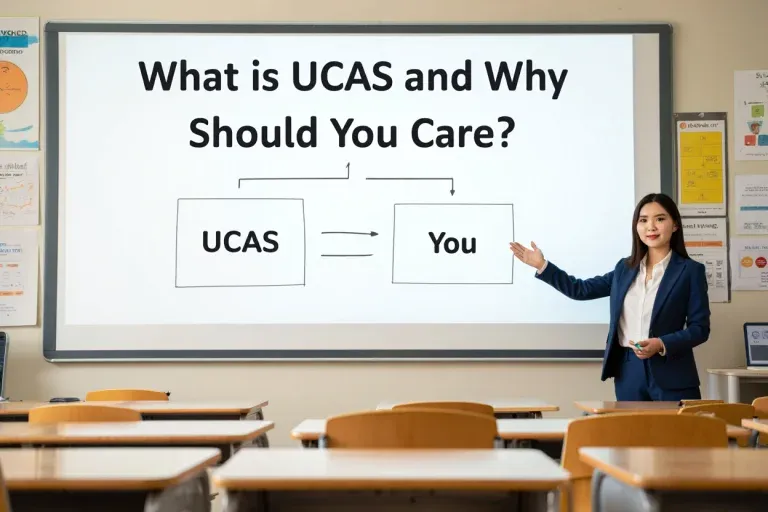When you’re an international student considering studying abroad, one of the first decisions you’ll face is which application system to use. If you’re aiming for universities in the UK or the US, you’ll need to handle either the UCAS (for UK universities) or the Common App (for US universities).
Choosing the right platform can make or break your chances of getting into your dream school. Understanding the ins and outs of each system is vital, and this is where Pearl Lemon Academy steps in. Our experts are here to guide you through the complexities of UCAS and the Common App, making your application process smoother and more efficient.
In this article, we’ll break down the key differences between UCAS and Common App, offering detailed insights into how each system works. We’ll look at deadlines, fees, essay formats, and much more to help you make the best decision based on your educational and career goals. Plus, we’ll share some little-known facts about these two systems that you won’t find elsewhere.
So, if you’re ready to make an informed decision, keep reading to find out which application system is right for you!
Book a Consultation
What is UCAS and Why Should You Care?

If you’re planning to apply to universities in the UK, the UCAS (Universities and Colleges Admissions Service) system will be your primary application platform. UCAS is designed to help students apply to up to five UK universities in one go. It simplifies the process by consolidating everything from academic qualifications to personal statements into a single submission.
Key Features of UCAS:
- Application Simplicity: UCAS allows you to submit one application for up to five universities. It’s a straightforward platform that’s easy to manage once you understand its core structure.
- Personal Statement Focus: UCAS places a heavy emphasis on the personal statement, which is a 4,000-character (or 47-line) essay that describes your academic background, interests, and motivations for studying your chosen course.
- Academic Achievements: UCAS allows you to showcase your A-level results or equivalent academic qualifications. UK universities focus more on your academic history rather than extracurricular activities.
Important UCAS Deadlines:
- 15 October: For applicants to Oxford or Cambridge, or medicine, dentistry, and veterinary science programs.
- 15 January: For most other courses.
- UCAS Track: Once you apply, you can track the progress of your application, allowing you to stay updated with offers from universities.
Pro Tip: If you’re applying for a highly competitive program, such as medicine or law, it’s essential to design your personal statement specifically to demonstrate your passion for the subject.
Schedule a Consultation with Pearl Lemon Academy to get expert guidance on crafting the perfect UCAS personal statement.
The Common App: Your Key to US College Applications

The Common App is a standard application used by over 900 universities in the United States. This platform allows you to submit one application to multiple universities, streamlining the process significantly. However, unlike UCAS, the Common App emphasizes personal essays, extracurricular activities, and letters of recommendation.
Key Features of the Common App:
- Multiple Schools, One Application: The primary benefit of the Common App is that you can apply to a wide range of schools without having to fill out individual applications for each one.
- Personal Essay: The Common App requires a personal essay that allows you to showcase your personality and experiences. This essay is far more narrative-based than UCAS’s personal statement and offers the opportunity to stand out with a compelling story.
- Extracurricular Focus: In addition to your personal essay, the Common App asks you to provide detailed information about your extracurricular activities, leadership roles, and community service, which are critical in US applications.
Key Deadlines for the Common App:
- Early Action/Early Decision: Most universities have early deadlines, usually around November 1.
- Regular Decision: Typically, the deadline is January 1 or 15.
Pro Tip: Crafting a standout Common App essay is essential. It’s your chance to show schools who you are beyond grades and test scores.
Need help with your Common App essay? Book a call with us at Pearl Lemon Academy, and we’ll help you create an essay that will get you noticed.
Key Differences Between UCAS and Common App

Understanding the differences between UCAS and the Common App is crucial for international students. The two systems operate under very different structures and expectations.
1. Number of Universities You Can Apply To
The number of universities you can apply to is one of the key differences between UCAS and the Common App. UCAS allows a more focused approach, limiting you to applying to up to five universities in one application.
- UCAS: You can apply to up to five universities in a single application.
- Common App: You can apply to multiple universities through a single platform, with no set maximum number of schools, though the average applicant applies to around 6-10 schools.
2. Application Focus
The focus of your application differs significantly between UCAS and the Common App. UCAS is centered on your academic achievements and personal statement, while the Common App emphasizes your personal essay and extracurricular involvement, allowing you to showcase a broader picture of who you are.
- UCAS: The emphasis is on your academic history and the personal statement. Universities are more likely to judge your application based on your academic achievements and your passion for your chosen course.
- Common App: The Common App puts more weight on your personal essay and extracurriculars. This makes it more flexible and personality-based, giving you a chance to show more than just your academic prowess.
3. Essays and Personal Statements
The essay requirements are another key distinction. UCAS requires a personal statement that focuses on your academic interests and reasons for choosing a particular course, while the Common App asks for a personal essay that allows you to tell a more personal and creative story about yourself.
- UCAS: The personal statement is your chance to explain why you’re a good fit for the program, but it has a more academic tone.
- Common App: The personal essay gives you a chance to tell your unique story and can be more reflective and creative.
4. Application Fees
The application fees vary between UCAS and the Common App. UCAS has a fixed fee structure, while the Common App’s fees depend on each university’s requirements, often leading to higher costs for multiple applications.
- UCAS: The application fee is £26 for a single application or £26 for up to five choices.
- Common App: Fees vary by university, but they typically range from $50-$100 per application.
5. Deadlines
Deadlines differ in terms of both timing and flexibility. UCAS has fixed deadlines, particularly for competitive programs, while the Common App offers more flexibility with varying deadlines depending on each university, including options for early decision and regular decision.
- UCAS: The deadlines are fixed, with earlier deadlines for competitive programs.
- Common App: Deadlines can vary by school, but they generally offer both early action and regular decision options.
6. Recommendation Letters
Both UCAS and the Common App require recommendation letters, but the number and focus differ. UCAS asks for a single reference, typically from a teacher or counselor, while the Common App requires two letters of recommendation that often emphasize leadership, character, and achievements.
- UCAS: Requires a reference, typically from a school teacher or counselor.
- Common App: You need two letters of recommendation from teachers or mentors, often emphasizing leadership, character, and achievements.
How to Tackle the Personal Statement vs Essay Dilemma

For students applying to both the UK and the US, the differences in application essays can be overwhelming. Here’s how to manage:
UCAS Personal Statement:
- Focus on Academics: Discuss your academic achievements, your motivation for studying a particular subject, and why you’re passionate about it.
- Don’t Make It a Resume: Avoid listing every activity you’ve done; instead, focus on experiences that relate to your course.
- Be Concise: You have 4,000 characters to work with, so make sure every sentence counts.
Common App Essay:
- Tell a Story: The Common App essay allows you to tell a personal story. It should focus on your experiences, what you’ve learned, and how they shape your future goals.
- Be Authentic: Authenticity is key. Share a story that genuinely reflects who you are and what you value.
Pro Tip: At Pearl Lemon Academy, we offer expert assistance in crafting both UCAS personal statements and Common App essays that will make you stand out from the competition.
Choosing Between UCAS and Common App: Which One Fits You?

Now that you have a better understanding of UCAS and the Common App, you may still be wondering which system is right for you. The answer depends largely on your goals, location, and the type of experience you want.
Ask Yourself:
- Do you want to study in the UK or the US? If you’re focused on a UK education, UCAS is your best bet. If you’re eyeing the US, the Common App is the way to go.
- Do you prefer a more academic or personal application? UCAS is more academically focused, while the Common App offers flexibility in how you present yourself.
Need personalized help with your application? Schedule a consultation with Pearl Lemon Academy to get the support you need.
Why Choose Us?
When it comes to university applications, we understand how important it is to present your best self. Here’s why we’re the right choice to guide you through your UCAS or Common App journey:
- Personalized Guidance: We take the time to understand your goals and craft personalized advice to ensure your application stands out.
- Clear, Actionable Strategies: Our proven approach ensures you make informed decisions, whether you’re applying to the UK or the US.
- In-Depth Expertise: With a deep understanding of both UCAS and Common App systems, we provide insights that help you navigate the complexities of each.
- Successful Outcomes: Our strategies focus on increasing your chances of acceptance to your dream university, giving you the best shot at success.
Choose us to guide you through the process, so you can focus on what matters most—your future.
Connect with us today!
FAQs: UCAS vs Common App
- Can I apply to both UCAS and Common App?
Yes, you can apply to universities in the UK through UCAS and universities in the US through the Common App at the same time. Just keep in mind the different deadlines and requirements for each system. - What should I focus on when writing my UCAS personal statement?
In your UCAS personal statement, emphasize your academic achievements, your interest in the course, and why you’re passionate about studying that subject at a specific university. It’s essential to design it for the program you’re applying for. - How important is the Common App essay?
The Common App essay is crucial as it provides insight into your personality, values, and experiences. It’s an opportunity to stand out beyond your grades and show why you’re a good fit for the school. - Do I need SAT/ACT scores for both UCAS and Common App?
While UCAS generally doesn’t require SAT/ACT scores for UK universities, many Common App schools in the US do, though some have become test-optional. Check each university’s requirements carefully. - How can Pearl Lemon Academy help with my applications?
At Pearl Lemon Academy, we specialize in crafting compelling UCAS personal statements and Common App essays. Our team provides expert guidance to help you showcase your strengths and improve your chances of acceptance.
Ready to Craft Your Perfect Application?
Managing the world of college applications can be overwhelming, especially when you’re dealing with different systems like UCAS and the Common App. But with the right guidance, you can make the best choice for your future.
At Pearl Lemon Academy, we specialize in helping students just like you successfully apply to both UK and US universities. Whether you need help crafting the perfect UCAS personal statement or need guidance on your Common App essay, we’re here to make sure your applications stand out.




